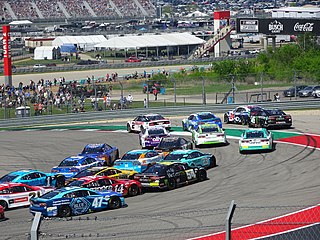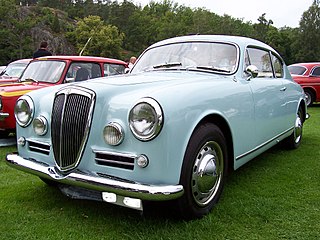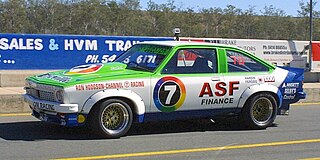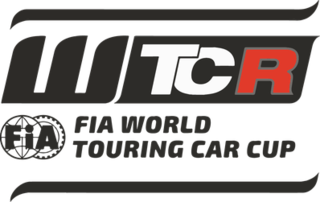
Auto racing is a motorsport involving the racing of automobiles for competition. In North America, the term is commonly used to describe all forms of automobile sport including non-racing disciplines.

Touring car racing is a motorsport road racing competition that uses race prepared touring cars. It has both similarities to and significant differences from stock car racing, which is popular in the United States.

The Fédération Internationale de l'Automobile is an association established on 20 June 1904 to represent the interests of motoring organisations and motor car users. It is the governing body for many auto racing events, including Formula One. The FIA also promotes road safety around the world.
Motorsport(s) or motor sport(s) are sporting events, competitions and related activities that primarily involve the use of automobiles, motorcycles, motorboats and powered aircraft. For each of these vehicle types, the more specific terms automobile sport, motorcycle sport, power boating and air sports may be used commonly, or officially by organisers and governing bodies.

A grand tourer (GT) is a type of car that is designed for high speed and long-distance driving due to a combination of performance and luxury attributes. The most common format is a front-engine, rear-wheel-drive two-door coupé with either a two-seat or a 2+2 arrangement. Grand tourers are most often the coupé derivative of luxury saloons or sedans. Many iconic car models, such as the Ferrari 250 GT, Jaguar E-Type, and Aston Martin DB5, are considered classic examples of gran turismo cars.

The Kwik Fit British Touring Car Championship is a touring car racing series held each year in the United Kingdom, currently organised and administered by TOCA. It was established in 1958 as the British Saloon Car Championship and was renamed as the British Touring Car Championship for the 1987 season. The championship, currently running Next Generation Touring Car regulations, has been run to various national and international regulations over the years including FIA Group 2, FIA Group 5, FIA Group 1, FIA Group A, FIA Super Touring and FIA Super 2000. A lower-key Group N class for production cars ran from 2000 until 2003.

A Le Mans Prototype (LMP) is a type of sports prototype race car used in various races and championships, including the 24 Hours of Le Mans, FIA World Endurance Championship, IMSA SportsCar Championship, European Le Mans Series and Asian Le Mans Series. Le Mans Prototypes were created by the Automobile Club de l'Ouest (ACO). The technical requirements for an LMP include bodywork covering all mechanical elements of the car. As of 2023, there are two classes within Le Mans Prototypes, designated LMP2 and LMP3.

The Group 3 racing class referred to a set of regulations for Grand Touring Cars competing in sportscar racing and rallying events regulated by the FIA. These regulations were active, in various forms, from 1957 to 1981.

In relation to Australian motorsport, Group C refers to either of two sets of regulations devised by the Confederation of Australian Motor Sport (CAMS) for use in Australian Touring Car Racing from 1965 to 1984. These are not to be confused with the FIA's Group C sports car regulations, used from 1982 to 1992 for the World Endurance Championship / World Sports-Prototype Championship / World Sportscar Championship and the 24 Hours of Le Mans.
Group 6 was the official designation applied by the FIA to two motor racing classifications, the Prototype-Sports Car category from 1966 to 1971 and the Two-Seater Racing Cars class from 1976 to 1982.
Group 7 was a set of regulations for automobile racing created by the Commission Sportive Internationale (CSI), a division of the modern Fédération Internationale de l'Automobile.

Group GT3, known technically as Cup Grand Touring Cars and commonly referred to as simply GT3, is a set of regulations maintained by the Fédération Internationale de l'Automobile (FIA) for grand tourer racing cars designed for use in various auto racing series throughout the world. The GT3 category was initially created in 2005 by the SRO Group as a third rung in the ladder of grand touring motorsport, below the Group GT1 and Group GT2 categories which were utilized in the SRO's FIA GT Championship, and launched its own series in 2006 called the FIA GT3 European Championship. Since then, Group GT3 has expanded to become the de facto category for many national and international grand touring series, although some series modify the ruleset from the FIA standard. By 2013, nearly 20 automobile manufacturers have built or been represented with GT3 machines.

The FIA World Touring Car Cup was an international touring car championship promoted by Eurosport Events and sanctioned by the Fédération Internationale de l'Automobile (FIA). It has had different incarnation of a World Touring Car Cup held between 1993 and 1995. Following the 2017 season, an agreement was reached for the World Touring Car Championship (WTCC) to become WTCR and use the TCR technical regulations. As factory teams were not allowed to compete in WTCR, the series lost the 'World Championship' status of the WTCC, instead becoming a 'Cup'.

Formula Regional (FR) is an FIA-approved moniker for certified regional one-make Formula Three championships with the concept being approved during the FIA World Motor Sport Council meeting in December 2017. The first series under new regulations were launched in Asia and North America in 2018, followed by European counterpart in 2019 and Japanese in 2020. On 13 December 2022, the Toyota Racing Series was rebranded as the Formula Regional Oceania Championship.
This page is based on this
Wikipedia article Text is available under the
CC BY-SA 4.0 license; additional terms may apply.
Images, videos and audio are available under their respective licenses.










